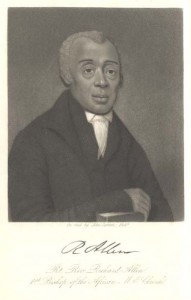Bermuda Helps Allen Documentary Go Viral
 Bermuda members of the AME Church have helped to make the first ever documentary about the life of church founder and abolitionist Bishop Richard Allen into perhaps one of the first religious-themed viral videos.
Bermuda members of the AME Church have helped to make the first ever documentary about the life of church founder and abolitionist Bishop Richard Allen into perhaps one of the first religious-themed viral videos.
The island’s AME Churches — celebrating the 125th anniversary of the Bermuda Annual Conference next week –along with fellow congregants worldwide have hosted “watch parties” attended by hundreds of people to view “Bishop Richard Allen: Apostle of Freedom” since it was posted online on February 13.
“I encourage all to view this, purchase the video, show it to our youth, show it to our visitors, show it to all who come by our churches,” said Teresa Wilson of St. John AME Church in Hamilton Parish in an on-line review of the film.
Produced by Mother Bethel AME Church and History Making Productions in Philadelphia, according to the web hosting site the film has now been seen in Bermuda, the US, South Africa, Canada, Great Britain, Trinidad and Tobago, India, Swaziland, Namibia, The Netherlands, Jamaica, Barbados, the US Virgin Islands, Mozambique, Ireland, The Domincan Republic, Switzerland, Mexico, Ghana, Zambia, Guyana, Spain, and Germany.
The film will remain online indefinitely thanks to a generous donation from New York Jets Offensive Lineman D’Brickashaw Ferguson. Mr. Ferguson is a lifelong member of the AME Church, and his charitable foundation sponsored the free online presentation.
In addition to music by the distinguished Wilberforce University Choir, under the direction of Jeremy Winston, the film’s score is composed by Grammy award winning producer Phil Davis of PHD Productions in Atlanta, Georgia. Davis has produced music with famous artists like Will Downing and Rachelle Farrell. Davis also once played piano for Big Bethel AME Church in Atlanta, Georgia. Rising opera star J’nai Bridges, Mezzo-Soprano who is the current Mid-Atlantic Regional Metropolitan Opera Champion, performs a spiritual solo on the film.
“This is the first high quality, PBS style documentary on the life of Bishop Allen, arguably one of America’s founding fathers,” says Mother Bethel’s pastor the Rev. Mark Kelly Tyler, PhD., who also served as executive producer, producer and writer for the film.
“Bishop Richard Allen: Apostle of Freedom” was shot in Philadelphia with Philadelphia area actors, and extras who are members of both Mother Bethel AME Church (the congregation Bishop Allen started in 1794) and Historic St. George’s UMC (the church that Allen walked out of because of racial segregation).
Born as a slave to Colonial Chief Justice Benjamin Chew, owner of the Cliveden Estate in Germantown, Bishop Richard Allen later purchased his freedom from a Delaware slave owner who bought him as a child. He went on to distinguish himself as more than just a church leader.
He hauled salt for the Continental Army during the American Revolution; he acted bravely in caring for the dying and burying the dead in the Yellow Fever Outbreak of 1793; he and Absalom Jones were the holders of the first copyright by African Americans when they published their rebuttal to Matthew Carey’s account of the Yellow Fever Outbreak; he was a successful entrepreneur, claiming George Washington’s Executive Mansion on 6th and Market Streets as a customer of his chimney sweep business; he opened his doors to those fleeing slavery on what would become known as the Underground Railroad as an Abolitionist; he organised one of the first major protests by African Americans when 3,000 people gathered at Mother Bethel Church to denounce the American Colonisation Society’s plan to send free Blacks to Africa; and, he had an active correspondence with the president of Haiti to the point that he sent missionaries to that nation in the 1820s to help them organise build infrastructure.
Bishop Allen is most known for his bold act of independence against the racial and religious intolerance of his time when he walked out of the segregated pews at St. George’s Methodist Church in the late 1700s. This act ultimately led to the establishment of the African Methodist Episcopal Church in 1816, which grew out of Mother Bethel and similar congregations in the northeast. This was America’s first denomination established by African Americans and Richard Allen became the first Bishop.

